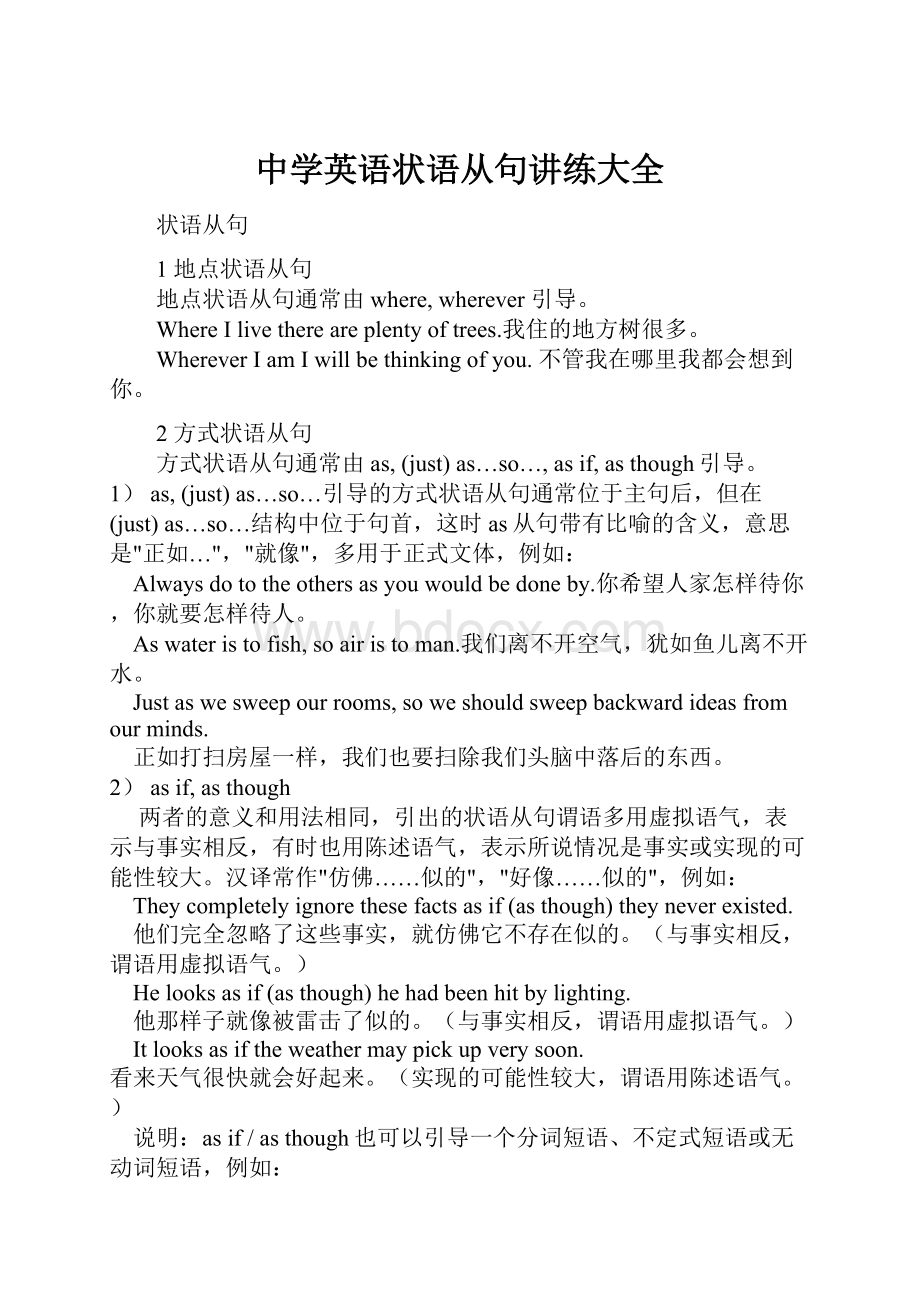中学英语状语从句讲练大全.docx
《中学英语状语从句讲练大全.docx》由会员分享,可在线阅读,更多相关《中学英语状语从句讲练大全.docx(97页珍藏版)》请在冰豆网上搜索。

中学英语状语从句讲练大全
状语从句
1地点状语从句
地点状语从句通常由where,wherever引导。
WhereIlivethereareplentyoftrees.我住的地方树很多。
WhereverIamIwillbethinkingofyou.不管我在哪里我都会想到你。
2方式状语从句
方式状语从句通常由as,(just)as…so…,asif,asthough引导。
1)as,(just)as…so…引导的方式状语从句通常位于主句后,但在(just)as…so…结构中位于句首,这时as从句带有比喻的含义,意思是"正如…","就像",多用于正式文体,例如:
Alwaysdototheothersasyouwouldbedoneby.你希望人家怎样待你,你就要怎样待人。
Aswateristofish,soairistoman.我们离不开空气,犹如鱼儿离不开水。
Justaswesweepourrooms,soweshouldsweepbackwardideasfromourminds.
正如打扫房屋一样,我们也要扫除我们头脑中落后的东西。
2)asif,asthough
两者的意义和用法相同,引出的状语从句谓语多用虚拟语气,表示与事实相反,有时也用陈述语气,表示所说情况是事实或实现的可能性较大。
汉译常作"仿佛……似的","好像……似的",例如:
Theycompletelyignorethesefactsasif(asthough)theyneverexisted.
他们完全忽略了这些事实,就仿佛它不存在似的。
(与事实相反,谓语用虚拟语气。
)
Helooksasif(asthough)hehadbeenhitbylighting.
他那样子就像被雷击了似的。
(与事实相反,谓语用虚拟语气。
)
Itlooksasiftheweathermaypickupverysoon.
看来天气很快就会好起来。
(实现的可能性较大,谓语用陈述语气。
)
说明:
asif/asthough也可以引导一个分词短语、不定式短语或无动词短语,例如:
Hestaredatmeasifseeingmeforfirsttime.
他目不转睛地看着我,就像第一次看见我似的。
Heclearedhisthroatasiftosaysomething.他清了清嗓子,像要说什么似的。
Thewavesdashedontherocksasifinanger.波涛冲击着岩石,好像很愤怒。
3原因状语从句
比较:
because,since,as和for
1) because语势最强,用来说明人所不知的原因,回答why提出的问题。
当原因是显而易见的或已为人们所知,就用as或since。
Ididn'tgo,becauseIwasafraid.
Since/Astheweatherissobad,wehavetodelayourjourney.
2) 由because引导的从句如果放在句末,且前面有逗号,则可以用for来代替。
但如果不是说明直接原因,而是多种情况加以推断,就只能用for。
Heisabsenttoday,because/forheisill.
Hemustbeill,forheisabsenttoday.
4目的状语从句
表示目的状语的从句可以由that,sothat,inorderthat,lest,forfearthat,incase等词引导,例如:
Youmustspeakloudersothat/inorderthatyoucanbeheardbyall.
Hewrotethenamedownforfearthat(lest)heshouldforgetit.
Bettertakemoreclothesincasetheweatheriscold.
5结果状语从句
结果状语从句常由so…that或such…that引导,掌握这两个句型,首先要了解so和such与其后的词的搭配规律。
比较:
so和such
其规律由so与such的不同词性决定。
such是形容词,修饰名词或名词词组,so是副词,只能修饰形容词或副词。
so还可与表示数量的形容词many,few,much,little连用,形成固定搭配。
sofoolish suchafool
soniceaflower suchaniceflower
somany/fewflowers suchniceflowers
somuch/littlemoney.suchrapidprogress
somanypeople suchalotofpeople
(somany已成固定搭配,alotof虽相当于many,但alotof为名词性的,只能用such搭配。
)
so…that与such…that之间的转换既为so与such之间的转换。
Theboyissoyoungthathecan'tgotoschool.
Heissuchayoungboythathecan'tgotoschool
6条件状语从句
连接词主要有if,unless,as/solongas,onconditionthat等。
.
if引导的条件句有真实条件句和非真实条件句两种。
非真实条件句已在虚拟语气中阐述。
unless=ifnot.
Let'sgooutforawalkunlessyouaretootired.
Ifyouarenottootied,let'sgooutforawalk.
典型例题
Youwillbelate___youleaveimmediately.
A.unless B.until C.if D.or
答案A。
句意:
除非你立即走,否则你就回迟到的。
可转化为Ifyoudongleaveimmediately,youwillbelate. B、D句意不对,or表转折,句子如为Youleaveimmediatelyoryouwillbelate.
7让步状语从句
though,although
注意:
当有though,although时,后面的从句不能有but,但是though和yet可连用
Althoughit'sraining,theyarestillworkinginthefield. 虽然在下雨,但他们仍在地里干活。
Heisveryold,buthestillworksveryhard. 虽然他很老,但仍然努力地工作。
Thoughthesorebehealed,yetascarmayremain.伤口虽愈合,但伤疤留下了。
(谚语)
典型例题
1)___sheisyoung,sheknowsquitealot.
A.When B.However C.Although D.Unless
答案:
C。
意为虽然她很年轻,却知道许多。
2) as,though引导的倒装句
as/though引导的让步从句必须表语或状语提前(形容词、副词、分词、实义动词提前)。
Childas/thoughhewas,heknewwhatwastherightthingtodo.
=Thoughhewasasmallchild,heknewwhatwastherightthingtodo.
注意:
a. 句首名词不能带任何冠词。
b. 句首是实义动词,其他助动词放在主语后。
如果实义动词有宾语和状语,随实义动词一起放在主语之前。
Tryhardashewill,heneverseemsabletodotheworksatisfactorily.
=Thoughhetrieshard,heneverseems…
虽然他尽了努力,但他的工作总做的不尽人意。
3) everif,eventhough. 即使
We'llmakeatripeventhoughtheweatherisbad.
4)whether…or- 不管……都
Whetheryoubelieveitornot,itistrue.
5) "nomatter+疑问词"或"疑问词+后缀ever"
Nomatterwhathappened,hewouldnotmind.
Whateverhappened,hewouldnotmind.
替换:
nomatterwhat=whatever nomatterwho=whoever
nomatterwhen=whenever nomatterwhere=wherever
nomatterwhich=whichever nomatterhow=however
注意:
nomatter不能引导主语从句和宾语从句。
(错)Nomatterwhatyousayisofnousenow.
(对)Whateveryousayisofnousenow.
你现在说什么也没用了。
(Whateveryousay是主语从句)
(错)Prisonershavetoeatnomatterwhatthey'regiven,
(对)Prisonershavetoeatwhateverthey'regiven. 囚犯们只能给什么吃什么。
8比较while,when,as
1)as,when引导短暂性动作的动词。
Justas/Justwhen/WhenIstoppedmycar,amancameuptome.
2)当从句的动作发生于主句动作之前,只能用when引导这个从句,不可用as或while。
Whenyouhavefinishedyourwork,youmayhavearest.
3)从句表示"随时间推移"连词能用as,不用when或while。
Asthedaywenton,theweathergotworse.
日子一天天过去,天气越变越坏。
9比较until和till
此两个连词意义相同。
肯定形式表示的意思是"做某事直至某时",动词必须是延续性的。
否定形式表达的意思是"直至某时才做某事"。
动词为延续性或非延续性都可 以。
正确使用这两个连词的关键之一就在于判断句中的动词该用肯定式还是否定式。
肯定句:
Isleptuntilmidnight.我一直睡到半夜时醒了。
WaittillIcallyou. 等着我叫你。
(在肯定句中可用before代替Let'sgetinthewheatbeforethesunsets.)
否定句:
Shedidn'tarriveuntil6o'clock.她直到6点才到。
Don'tgetoffthebusuntilithasstopped.公共汽车停稳后再下车。
Ididn'tmanagetodoituntilyouhadexplainedhow. 直到你教我后,我才会做。
1)Until可用于句首,而till通常不用于句首。
Untilyoutoldme,Ihadheardnothingofwhathappened.
直到你告诉我以前,出了什么事我一点也不知道。
2)Untilwhen疑问句中,until要放在句首。
---Untilwhenareyoustaying?
你呆到什么时候?
---UntilnextMonday. 呆到下周一。
注意:
否定句可用另外两种句式表示。
(1)Notuntil…在句首,主句用倒装。
Notuntiltheearlyyearsofthe19thcenturydidmanknowwhatheatis.
直到19世纪初,人类才知道热能是什么。
NotuntilIbegantoworkdidIrealizehowmuchtimeIhadwasted.
直到我开始工作,我才认识到了我已蹉跎了几多岁月。
(2) Itisnotuntil…that…
10表示"一…就…"的结构
hardly/scarcely…when/before,nosooner…than 和assoonas都可以表示"一…就…"的意思,例:
Ihadhardly/scarcelygothomewhenitbegantorain.
Ihadnosoonergothomethanitbegantorain.
AssoonasIgothome,itbegantorain.
注意:
如果hardly,scarcely或nosooner置于句首,句子必须用倒装结构:
Hardly/ScarcelyhadIgothomewhenitbegantorain.
NosoonerhadIgothomethanitbegantorain.
练习题
1.I’llletyouknow____hecomesback.
A.beforeB.becauseC.assoonasD.although
2.Shewillsingasong____sheisasked.
A.ifB.unlessC.forD.since
3.Wewillwork____weareneeded.
A.wheneverB.becauseC.sinceD.wherever
4.Readitaloud_____theclasscanhearyou.
A.sothatB.ifC.whenD.although
5._____yougo,don'tforgetyourpeople.
A.WheneverB.HoweverC.WhereverD.Whichever
6.Itisabouttenyears_____Imetyoulast.
A.sinceB.forC.whenD.as
7.Theywillneversucceed,_____hardtheytry.
A.becauseB.howeverC.whenD.since
8._____stillhalfdrunk,hemadehiswayhome.
A.WhenB.BecauseC.ThoughD.As
9._____shewasverytired,shewentonworking.
A.AsB.AlthoughC.EvenD.Inspiteof
10.Busy_____hewas,hetriedhisbesttohelpyou.
A.asB.whenC.sinceD.for
11.IlearnedalittleRussian_____Iwasatmiddleschool.
A.thoughB.althoughC.asifD.when
12._____wegottothestation,thetrainhadleftalready.
A.IfB.UnlessC.SinceD.When
13._____therainstops,we'11setoffforthestation.
A.BeforeB.UnlessC.AssoonasD.Though
14.Shewas_____tired_____shecouldnotmoveaninch.
A.so,thatB.such,thatC.very,thatD.so,as
15.Wedidn’tgohome_____wefinishedthework.
A.sinceB.untilC.becauseD.though
16.I'llstayhere_____everyoneelsecomesback.
A.evenifB.asthoughC.becauseD.until
17.Althoughit'sraining,_____arestillworkinginthefield.
A.theyB.buttheyC.andtheyD.sothey
18.Speaktohimslowly_____hemayunderstandyoubetter.
A.sinceB.sothatC.forD.because
19.You'llmissthetrain______youhurryup.
A.unlessB.asC.ifD.until
20.Whenyoureadthebook,you'dbettermakeamark_____youhaveanyquestions.
A.atwhichB.atwhereC.theplaceD.where
21.We'dbetterhurry______itisgettingdark.
A.andB.butC.asD.unless
22.Ididn'tmanagetodoit_____youhadexplainedhow.
A.untilB.unlessC.whenD.before
23._____hecomes,wewon'tbeabletogo.
A.WithoutB.UnlessC.ExceptD.Even
24.Ihurried_____Iwouldn'tbelateforclass.
A.sinceB.sothatC.asifD.unless
25._____Icatchacold,Ihavepaininmyback.
A.EverytimeB.ThoughC.EvenD.Where
26.What'sthematter_____theystillhaven'tansweredthetelegram?
A.whenB.thatC.thoughD.however
27.Bringitnearer_____Imayseeitbetter.
A.althoughB.eventhoughC.sothatD.since
28.YoumayarriveinBeijingearly_____youmindtakingthenighttrain.
A.thatB.thoughC.unlessD.if
29.Helenlistenedcarefully_____shemightdiscoverexactlywhatsheneeded.
A.inthatB.inorderthatC.incaseD.eventhough
30.Morepeoplewilleatoutinrestaurants_____theydotoday.
A.thanB.whenC.whileD.as
31._____hardshetries,shecanhardlyavoidmakingmistakesinherhomework.
A.MuchB.HoweverC.AsD.Although
32.Poor_____itmaybe,thereisnoplacelikehome,_____youmaygo.
A.as;whereverB.though;wheneverC.inspiteof;whenD.that;wherever
33.Thechildwas__immediatelyaftersupper.
A.enoughtiredtogotobedB.tootiredtogotobed
C.sotiredthathewenttobedD.verytired,hewenttobed
34.Thehistoryofnursing__thehistoryofman.
A.asoldasB.isoldthanC.thatisasoldasD.isasoldas
35._____borninChicago,theauthorwasfamousforhisstoriesaboutNewYork.
A.SinceB.OnceC.WhenD.Although
36._____westoodatthetopofthebuilding,thepeoplebelowwerehardlyvisible.
A.AsB.AlthoughC.UnlessD.Inspiteof
37.ScarcelywasGeorgeWashin